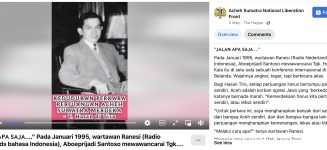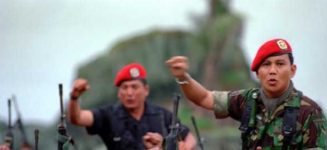Two years ago I argued that it was not surprising that the 2006 Nobel Peace Prize was not awarded to key figures in the Aceh peace process – contrary to the expectation that it should have partly gone to Indonesia’s leaders. What has changed since Helsinki’s mediator Martti Ahtisaari has now received the prize?
In 2006 it was widely expected that it would be given to those involved in brokering the peace in Aceh which had been achieved just a year earlier. However, Nobel Peace Prize winners are not necessarily those whom we believe have done the greatest service for peace. Surely they must have made a significant contribution, but the traditional way the prizes were bestowed in the name of Alfred Nobel suggests that it should carry – as it did in the recent past – a clear moral and political message.
Instead of focusing on the peace process at state level as they traditionally did, the Norwegian Nobel Committee in 2006 opened a new horizon by giving the award to Muhammad Yunus and the Grameen Bank. War against poverty is a significant element of world peace.
Peace thus no longer concerns efforts at diplomatic levels only. The situation on the ground matters much, and this is certainly true for Aceh. However, since the implementation of Aceh’s peace deal until late 2006 was widely considered successful, why should the prize be given for these efforts rather than pointing to a more critical issue?
The Nobel Peace Prize is intended to strengthen values related to the cause the winners pursued, and in so doing encourage them and the world toward the enhancement of peace, human rights and democracy. Since the nature of conflicts varies, the resolutions obviously cannot be expected to be readily credible. There is no simple panacea. It follows, even if the issues have been settled, that one has to judge whether the solutions still need to be pushed forward.
This, it seems, is most critical: It is the ongoing process toward terminating conflicts with a greater, not lesser, degree of difficulties, rather than some definite peace deals, that seem to fit the Nobel’s mission.
A number of cases demonstrate the importance of this pattern. In the 1990s, Bishop Carlos Filipe Ximenes Belo and Jose Ramos-Horta went through much pain and trouble to campaign for the East Timorese right to self-determination. This aim was considered urgent, but still far from being feasible. Hence, by 1996, they received the prize.
Similarly, Nelson Mandela and Fredrik de Klerk were heavily pressurized from inside and outside during their negotiations to democratize South Africa when they were awarded the prize in 1993 – one long and critical year before Mandela was finally released from prison.
The Northern Ireland parties (John Hume and David Trimble), too, needed a strong push by being awarded the prize in 1998 as peace talks gained momentum but the decommissioning was hard to implement – as it turned out, it indeed took years before it materialized.
Likewise, Mikhail Gorbachev was awarded the prize for his role in ending the Cold War in 1990 when the crisis in the former Soviet Union intensified. The assumption that this was a critical year was demonstrated by the pro-communist and Yeltsin coups in that year.
In 1991 Aung San Syu Kyii received the prize. Being imprisoned by Myanmar’s brutal junta, she was unable to fight for her cause the way Belo and Ramos-Horta did for East Timor. She won the 1988 elections, and as international support grew, it was awarded to her.
Another clear example of a peace effort in a critical moment being decisive was when it was given to Yasser Arafat, Shimon Peres and Yitzhak Rabin in 1994. Never before had a better chance emerged for a settlement in the Israel-Palestine conflict. Yet at the same time it was feared the situation could remain precarious — which proved correct as the talks later failed. Hence, the Nobel pushed then.
In short, Nobel Peace Prizes in the last 15 years or so were not about conflicts that have been settled as Aceh was in late 2006. Instead, it was consistently decided to push ongoing efforts which were at a critical moment or facing a stumbling block. Timing is important.
As early as late 2006, the implementation of the Helsinki deal in Aceh was applauded even by those who had been skeptical at the outset. No other conflict had been resolved, with its crucial parts implemented, in less than two years. Hence, the Committee chose to encourage other peace efforts rather than award the prize to any figure working on peace in Aceh.
This is not to say that mediator Martti Ahtisaari didn’t deserve the prize then or now. He has been widely acknowledged as both exceptionally capable and authoritative (“like a father” said one GAM negotiator), hence, instrumental in the Aceh peace process.
The fact, however, that he is now awarded the prize means the Committee has returned to its traditional pattern of considering world politics at regional and diplomatic levels, and took the most obvious among several candidates. It’s possible that (post-) conflict issues in which Ahtisaari was involved needed more urgent attention.
Ahtisaari has brought peace in Asia, Africa and Europe over three decades, but his greatest success was on the Namibia issue in the late 1980s when he was able to move South Africa to accept Namibia’s independence.
Post-conflict conditions, including Aceh’s peace, cannot be taken for granted. But it was Kosovo that proved most difficult and delicate since Ahtisaari’s solution, supported by the West, gave Kosovo independence and angered other key players notably the Serbs, who were supported by Russia. Moreover, recent trouble with Russia and Georgia has invoked global fear of a new cold war, which could become aggravated if Kosovo becomes a new hot spot in the Balkans; such, in any case, was one of the most recent anxieties in the European capitals.
The choice of Martti Ahtisaari, therefore, seems the more imperative given the Committee’s mission to convey its message when some conflicts need greater attention than others.



